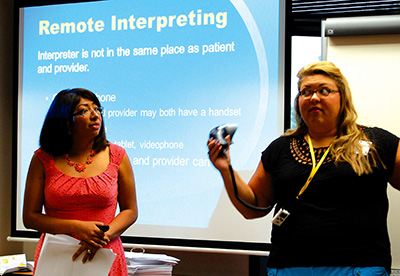By Elsa Baughman
JACKSON – Andres Hill, one of 19 people attending an intensive interpeter’s workshop offered by the Mississippi State Department of Health, began to interpret when he was attending high school in his hometown of New Orleans. He was the only one in his family who spoke English and Spanish well so he used to accompany his grandmother to her doctor’s visits. “Interpreting was important to me at that time but I never considered it as a career opportunity,” Hill said.

Laura Rivera, (right) an interpreter supervisor at the Department of Human Services’ Division of Family and Children’s Services in Jackson, explains how to use the interpreter audio equipment during the training. Shirley Pandolfy (left), operations management analyst principal, was one of the instructors of the 40-hour workshop. (Photo by Elsa Baughman)
Nineteen people attended “Bridging the Gap,” a six-day training held in Jackson at the end of June. The Office of Health Disparity Elimination of the Mississippi State Department of Health is offering the course in different cities in Mississippi to improve provider-patient communication by decreasing language barriers and increasing cultural awareness.
The trainers emphasized the treatment of culture as an integral part of communication and an important aspect of the interpreter’s work.
The topics included the roles of the interpreter, code of ethics for interpreters in health care, modes of interpreting, memory development, the role of culture in medical interpretation, cultural bumps, medical terminology and the body systems such as the circulatory, digestive, nervous and so on.
Among the 19 people who attended the training, 18 are of Hispanic descent and one is married to a Hispanic. Some work in clinics, others are employees of the Department of Human Services in Jackson and the Mississippi State Department of Health Clinic in Scott county (Forest) and in Madison county (Canton).
“There are so many needs among Hispanics, especially the language barrier,” Hill said, “and what a privilege to return to my first love and be there for someone who needs me. For me it was my grandmother and who knows, tomorrow that person may be someone else’s grandmother,” he said.
Something interesting Hill learned was that the base of good interpretation requires the use of three important factors: skip nothing, add nothing and change nothing of the conversation between two people. “And by applying these three principles we achieve proper communication,” he said.
Amanda Fitzgerald was born in Honduras. Her parents are from Nicaragua and at the age of three her family came to live in Miami. She now lives in Brandon and works at the Mississippi State Department of Health County Clinic in Forest. She says she became interested in this training because there are many things that she needs to learn, especially about the culture and the medical terminology.
“I like working with the public and that is why I took the job in the Department of Health, where many people of different cultures go for health services,” she said.
What she liked the most about the training was the area of professionalism while interpreting. “Since I serve as an interpreter at my job, I want to do it correctly and I need to know well the medical vocabulary in both languages in order to be able to communicate well with the patient and the doctor,” she explained.
The training also included information on telephonic and video remote interpreting in health care settings, which are becoming increasingly common in different parts of the United States and in Mississippi.
At the end of the training the participants took an exam. If they pass they will be identified as a qualified medical interpreter and may take the test to become a certified healthcare interpreter, if they wish.
The next 40-hour course will be offered in Jackson on Sept. 16-18 and 23-25, from 8:30 a.m. – 4:30 p.m. The cost is $300 for those who register by Aug. 14 and $400 two weeks prior to the course. For more information contact Dora Moreno, 601-206-1540, dora.moreno@msdh.ms.gov.
